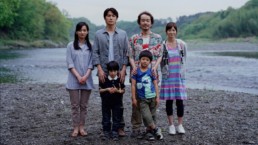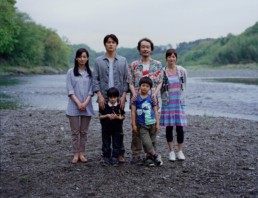Review: ‘Like Father, Like Son’
In acclaimed director Kore-eda Hirokazu’s poignant family drama, two families discover the son they’re raising is not biologically theirs.
Imagine raising a child, your only child, for six years until one day, a devastating phone call changes everything you thought you knew about your family. The little things you take for granted, like the way he looks while sleeping and seeing his artwork hanging on the walls, suddenly take on a whole new meaning. As a parent, you suddenly feel unjustly stripped of your feeling of contentment and security. In acclaimed director Kore-eda Hirokazu’s poignant family drama Like Father, Like Son, love is put to the test as two families discover that the son they’ve raised for six years is not biologically theirs, but the result of a switched-at-birth scandal.
The protagonist of the Japanese drama is Ryota; a stiffly portrayed businessman whose priority is his career and, consequently, allows his family to fall by the wayside. His wife Midori and their six-year-old son Keita share a special bond, similar to that of a single mother raising her child. Although their parenting styles differ, both of their worlds are rocked when they are told by an ashamed hospital lawyer that Keita is not their “real” son. They then learn that their biological son is being raised by the true parents of the child they have been raising. Upon meeting each other, it’s also evident that their parenting and lifestyles are completely different, which further throws them into a whirlwind of emotion. “Like Father” stays firmly grounded on the internal struggles of the respective families and ultimately asks the question, what really is family?
His style is minimalistic and natural; tightly composed shots give the film a meditative quality that leaves audiences in a state of reflection after the film’s end.
Director Kore-eda finds his strength in Like Father, Like Son not only as the director but also as the writer and editor. His style is minimalistic and natural; tightly composed shots give the film a meditative quality that leaves audiences in a state of reflection after the film’s end. The cinematography is another element that should be praised; the juxtaposition between sterile and natural plays against each other for a powerful look. One shot that stands out is the moment when Ryota and Yudai, the father who has been raising Ryota’s biological son, sit next to each other on a rock next to a flowing creek. It’s a wide shot; Ryota sits in tailored yet casual attire, his posture reinforcing the fact that he is the predominant character in the scene. His clean, brown loafers rest next to Yudai’s worn-in grey New Balance tennis shoes. The subtleness explains so much about the lives of these men. It’s a telling image portrayed without words.
The debate between what makes “a father” encourages the audience to think about our own fathers and, for better or worse, find sympathy with the protagonist Ryota. Is it purely one’s bloodline that makes a family, or is it the time spent during childhood that gives accreditation to the word “father”? Kore-eda quite literally examines nature vs. nurture with top-notch acting from well-known Japanese actors Masaharu Fukuyama and Machiko Ono. Along with an authentically great performance from child actor Keita Ninomiya, this film is packaged to perfection. It’s provoking storyline won over critics at the 2013 Cannes Film Festival, earning the coveted jury prize. A festival favorite, Like Father, Like Son opened in New York January 17th and Los Angeles on January 24th and is not to be missed.
Morgan Rojas
Certified fresh. For disclosure purposes, Morgan currently runs PR at PRETTYBIRD and Ventureland.


